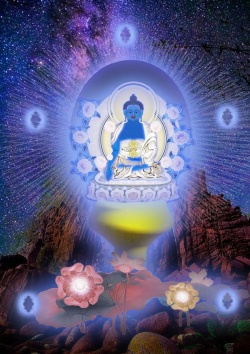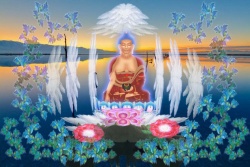Aspiration Practice
Aspiration Practice
Trainer with Client with prosthetic leg The practice is about opening to our full self, whatever it brings up, and then, nevertheless, saying these words. Because this practice comes in a whole genre of practices of the heart practices, which are called, Practices of Aspiring. They're like the aspiration practices. And I mentioned last night that this is like having a work out for the heart muscle. Like when you go to the gym and you work out your stiff, tight muscles. This is like a work out for your closed, tight heart.
And so, part of that work out is getting in touch with what you feel as you go through each of these categories —the open heart that you already feel and the closed heart that you feel, the open mind that you already feel and the closed mind, and even so, especially so, still saying these words throughout each of these stages.
There's a lot of power in this. I don't exactly know precisely how it works, but there's some kind of power in willing to make the wish that as you live your life, as your life goes on, that the heart muscle opens, or that the circle of compassion and love can spread. And it doesn't seem that the way that that actually can occur is by trying to live up to some ideal of what you think that means.
If you think that the practice of widening the circle of compassion will be based on some ideal of what you think a compassionate person is, then you're always just going to be left feeling poverty stricken or inadequate or trying to stretch for some goal that is beyond you. Rather than that, with each of the stages, you just acknowledge what you're feeling, whatever it is.
Sometimes what it is is that you feel nothing. Like, someone says, you're sitting there doing shamatha-vipashyana and all hell is breaking loose, you're having all kinds of emotions, and everything, and you're supposed to keep labeling it thinking and going back to the breath. You're having a lot of thoughts and memories and a lot is coming up, and then the gong rings and you're given full permission to get in touch with all those feelings, and you go, kind of like, numb, can't feel anything. So, that happens.
But whatever happens, just acknowledge it fully and still say these words. It's making this wish: Well, right now I already feel this love, and may that love still expand further.
And, right now I'm feeling numb or I'm feeling angry or I'm feeling resentment, and may that resentment and anger... by my willingness to completely accept that part of myself... See, that's the key, the willingness to accept whatever is coming up in you. By this willingness, then you can say, May it come to pass that during my life that I can say in a very genuine way, May this difficult person enjoy happiness and the root of happiness.
Do you see what I'm saying? It's like a lot of the Buddhist teachings, it's paradoxical. I think I'm repeating myself a lot here, but it's because I think I already know a lot of the pitfalls that we fall into when we start with these kinds of practices.
If you're at the stage of your friend, or the neutral person, and you're saying to yourself, May this certain person (you say their name, visualize their face), and you say, May they enjoy happiness and the root of happiness, and you feel like some kind of hypocrite, because that's not really what you're feeling... Well, I think what I'm saying here is: have some kind of respect for the hypocrites of the world, have some kind of actual appreciation for that millions of people feel... whatever feeling may come up in you this morning, as we do this, millions of people feel these things.
Millions and millions and billions. And not just living now, but in the past and in the future. People go through whatever you go through. And somehow it's only by really completely acknowledging what you're feeling with honesty, and yet, nevertheless, making this aspiration. It's something between the complete sort of absurdity of trying to both those things at once that begins to awaken your maitri and your compassion, your joy and equanimity.
It is our exploration of our own being, our suffering and our joy. It's this exploration of our own being —and I consider these aspiration practices an exploration of our being. It's only through this kind of exploration of our own being that we can connect. It's like this becomes the bridge for being able to connect with other people, and really be there with other people. And this pedestal thing, of trying to live up to some ideal, that will create barriers between ourself and ourself and definitely between ourselves and other people.
One of the things we come in contact with in doing this, we come in contact with the barriers. You can just sort of feel them go up, in terms of dissociating or aggression, different kinds of barriers come up. This is a practice about seeing all of that, allowing all of that, and, at the same time, making the aspiration. And this is how the circle widens.
Now, this expression: May I enjoy happiness and the root of happiness. This root of happiness, I would just like to ask you to start this weekend and then I would encourage you to spend the rest of your life trying to find out what that is. [laughter]
The Buddhist teachings are filled with answers to that question. At one level, they say the root of happiness is beginning to connect with the profound experience of emptiness of the open dimension of our minds and hearts. And then they say, but at an every day level, the root of happiness is beginning to get smart about how our words and our actions can set off a chain reaction of suffering deescalating —the way we speak and the way we act can actually add up to suffering...
like not making matters worse, but making matters smoother or cooling the heat of anger, bringing some kind of happiness, more and more happiness. Or, our actions and our words can definitely —and I think we all know this one— can escalate the suffering and the confusion and the aggression.


